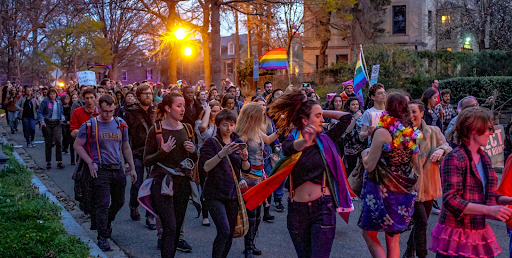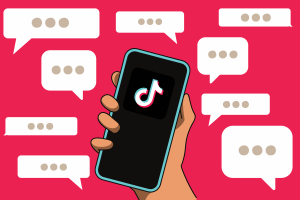Don’t say gay

The LGBTQ+ community peacefully protesting their right to equality and freedom.
April 1, 2022
The LGBTQ+ community has been at a constant fight for equality since the beginning of time. Within the past few decades, we have made great strides in equality under the Obama administration with marriage equality, protection of transgender individuals along with nondiscrimination laws passed in the beginning of the 2000’s. However, with a drastic change in values under the highest office brought instability for LGBTQ+ rights. Most recently, a terrifying law for LGBTQ+ youth has been brought to the state of Florida nicknamed the “Don’t Say Gay” bill.
“Don’t say gay” also known as The Parent Rights in Education Bill outlaws education involving sexual orientation and gender identity in kindergarden through third grade classrooms along with restrictions in conversation throughout the progressing grades. Supporters of this bill argue that it is the parents’ job to introduce sexual orientation to their children, not teachers. Many are concerned for the future of the LGBTQ+community as this bill was signed into law this past Monday by Florida Governor Ron DeSantis.
“They support injecting woke gender ideology into second grade classrooms,” said DeSantis, commenting on opponents to the law.
Many teachers are concerned with how this law will affect their classrooms as many believe this bill is a solution in search of a problem. According to an NPR article, reviewing teachers concerns on the bill, Floridan first grade teachers aren’t discussing sexual oriantation within their curriculum, yet they do discuss families.
“It makes me wonder,” said Paula Stephans, a first grade teacher at Eisenhower Elementary, “When I talk about families in my classroom, am I going to be violating this law because the children were having discussions about what their family looks like?”
With a great possibility that these children might have two moms or dads, the question remains as to how these teachers will have to adjust family discussion.
As this law primarily directs its language toward kindergarten through third grade classrooms, it does state that any discussion beyond the third grade must be, “age-appropriate or developmentally appropriate in accordance with state standards.” This creates quite the gray area as to what “developmentally appropriate” discussion entails and what will truly be allowed in classrooms. With a vague understanding of what exactly is approved to talk about in a school setting, many educators fear that any conversation involving the LGBTQ+ at all will result in lawsuits of the school board by upset parents. Under such circumstances, education of sexual orientation and gender identity will fall to less than nothing, leaving LGBTQ+ youth vulnerable as this bill perpetuates these ideas as taboo and seemingly unspeakable.
Directly after the bill was passed, an uproar began through social media platforms by celebrities along with many political figures as even President Joe Biden called the bill “hateful.”
According to AP News, “Florida students staged walkouts and packed into committee rooms and statehouse halls to protest the measure, often with booming chants of ‘We say gay!’”
As earlier controversy online prompted changes in the beginning stages of the bill with it initially including the requirement of teachers to out students to their parents, it is hard to deny that the voices of change for the LGBTQ+ community refuse to go unheard.
“The bill’s intentionally vague language leaves teachers afraid to talk to their students and opens up school districts to costly and frivolous litigation from those seeking to exclude LGBTQ people from any grade level,” said state Representative Carlos G. Smith. “Even worse, #DontSayGay sends a hateful message to our most vulnerable youth who simply need our support.”








